
2. Albert Einstein
A brilliant physicist who reshaped science with his theory of relativity, once failed a school exam but later won a Nobel Prize.
Clue 1: Famous for the equation E=mc².Clue 2: Known for his wild hair and playful personality.
Prompt
Which drives humanity forward more—what we know, or what we imagine?
1. George Washington
First U.S. President who led the revolution to victory, refused becoming king, and famously had wooden teeth (partially true!).
Clue 1: Appears on the U.S. one-dollar bill.Clue 2: Voluntarily stepped down after two terms as president.
Prompt
Can a society stay free without the right to challenge its leaders?
3. Friedrich Nietzsche
A German philosopher who challenged traditional beliefs, wrote about the “will to power,” and once hugged a beaten horse in tears.
Clue 1: Known for the quote “God is dead.”Clue 2: Suffered a mental breakdown in his later years.
Prompt
Do hardships actually make us stronger—or just harder?
4. Confucius
A Chinese philosopher who taught respect, family, and virtue, whose wise sayings still guide millions, despite never writing them down himself.
Clue 1: His teachings were recorded by his followers in The Analects.Clue 2: Emphasized honoring parents and learning throughout life.
Prompt
Is helping someone in the moment enough—or does real compassion mean giving them tools for life?
5. Aristotle
A Greek philosopher who taught Alexander the Great, studied everything from logic to biology, and shaped Western thinking for centuries.
Clue 1: Student of Plato and teacher of Alexander the Great.Clue 2: Founded a school called the Lyceum in Athens.
Prompt:
Is it possible to truly “know yourself”—or is that a lifelong pursuit we never finish?
6. William Shakespeare
An English playwright whose timeless stories of love, power, and betrayal shaped literature, rumored to have invented over 1,700 English words.
Clue 1: Wrote Romeo and Juliet, Hamlet, and Macbeth.Clue 2: Often called the greatest writer in the English language.
Prompt:
Have you ever been fooled by something—or someone—that seemed perfect at first glance?
7. Galileo Galilei
An Italian scientist who improved the telescope, proved Earth moves around the sun, and was put on trial for his discoveries.
Clue 1: Called the “father of modern science.”Clue 2: His support of heliocentrism got him in trouble with the Church.
Prompt:
Can science and faith coexist—or are they destined to clash?
8. Pablo Picasso
A Spanish artist who changed art forever with Cubism, once painted a masterpiece after seeing bombed ruins during a war.
Clue 1: Created the famous painting Guernica.Clue 2: Known for co-founding the Cubist movement.
Prompt:
What part of your childhood creativity have you lost—or managed to keep?
9. Harriet Tubman
An American abolitionist who escaped slavery, then risked her life guiding others to freedom through the Underground Railroad—over a dozen times.
Clue 1: Nicknamed “Moses” for leading people to freedom.Clue 2: Worked as a spy for the Union Army during the Civil War.
Prompt:
What would you risk everything for—and what does freedom mean to you today?
10. Michelangelo Buonarroti
An Italian Renaissance artist who sculpted David and painted the Sistine Chapel ceiling, often worked alone and disliked being interrupted.
Clue 1: Also designed parts of St. Peter’s Basilica in Rome.Clue 2: Considered a rival of fellow artist Leonardo da Vinci.
Prompt:
Is art something we invent—or something we uncover from a deeper, higher truth?
11. George Washington Carver
An American scientist and inventor who promoted crop rotation, created hundreds of peanut uses, and once declined a job from Edison.
Clue 1: Helped poor farmers by teaching sustainable agriculture.Clue 2: Made products like paint, ink, and glue from peanuts—though not peanut butter!
Prompt:
What have you come to understand more deeply—not through study, but through love?
12. Francis Bacon
An English philosopher and writer who developed the scientific method, once caught for taking bribes but still shaped modern investigation.
Clue 1: Known as the father of the scientific method.Clue 2: Wrote Novum Organum, a key work in scientific thinking.
Prompt:
Is knowledge still power today—or has something else taken its place?
13. Thomas Edison
An American inventor with over 1,000 patents, created the light bulb, and once electrocuted an elephant to prove a point.
Clue 1: Founded the first industrial research lab.Clue 2: Known for inventing the phonograph and improving electric light.
Prompt:
Do you think success comes more from raw talent—or from hard work and trial and error?
14. Margaret Thatcher
A British Prime Minister known as the “Iron Lady,” broke barriers, led tough reforms, and survived an attempted assassination by bomb.
Clue 1: First woman to serve as UK Prime Minister.Clue 2: Strongly opposed the Soviet Union and trade unions.
Prompt:
Is this quote empowering, provocative—or both? How much truth do you think it holds today?
15. Lao Tzu
An ancient Chinese philosopher credited with founding Taoism, quietly left society riding a buffalo and wrote wisdom in Tao Te Ching.
Clue 1: Taught that harmony comes from living simply and naturally.Clue 2: His name means "Old Master."
Prompt:
What’s one small step you've been avoiding—and where might it lead if you took it?
16. Benjamin Franklin
An American inventor, writer, and statesman who helped draft the U.S. Constitution. Famously flew a kite in a storm, unlocking electrical secrets.
Clue 1: Appears on the U.S. $100 bill.Clue 2: Invented bifocal glasses and the lightning rod.
Prompt:
At what age do you think people stop growing — and how can we keep that spark alive throughout life?
17. Fyodor Dostoevsky
A Russian novelist who explored human suffering and faith, once faced a firing squad before being suddenly spared at the last second.
Clue 1: Wrote Crime and Punishment and The Brothers Karamazov.Clue 2: Struggled with epilepsy, debt, and deep moral questions.
Prompt:
Is hope a choice we make, or something life gives — and can it survive without action?
18. Genghis Khan
A Mongol warrior who united nomadic tribes into a vast empire, once killed his brother over food and trusted loyalty above all.
Clue 1: Conquered more land than any other ruler in history.Clue 2: Known for brilliant tactics and brutal warfare.
Prompt:
When is ambition a driving force for progress — and when does it become dangerous?
19. Alan Turing
Mathematician and wartime codebreaker, deciphered Nazi codes, revolutionizing cryptography and laying foundations for modern computing.
Clue 1: His Enigma codebreaking helped shorten World War II.Clue 2: Was punished for being gay.
Prompt:
Why do you think society often underestimates unconventional people — and how can we better recognize hidden potential?
20. John F. Kennedy
Dynamic American President, united the nation during the Cold War, inspiring space exploration and progress. Inspired a generation, and was tragically assassinated while riding in a car.
Clue 1: Youngest elected U.S. president.Clue 2: Faced the Cuban Missile Crisis during his presidency.
Prompt:
Should service come before self-interest?
21. Niccolo Machiavelli
Astute Florentine diplomat, penned "The Prince" during exile, forever reshaping modern political strategy with radical, profound insights. Explored power and politics.
Clue 1: Believed ends can justify the means in politics.Clue 2: His ideas still spark debate about ethics and leadership today.
Prompt:
Can politics ever be truly moral?
22. Rene Descartes
A French philosopher and mathematician who laid the groundwork for modern thought, combined logic with science, and helped invent analytic geometry.
Clue 1: Believed true knowledge starts with deep doubt and reason.Clue 2: Developed a system linking algebra and geometry.
Prompt:
Does questioning things make you smarter? Why or why not?
23. Abraham Lincoln
Self-taught lawyer and U.S. President, led through civil war, abolished slavery, and united a fractured nation with resolve.
Clue 1: Delivered the Gettysburg Address to honor fallen soldiers.Clue 2: Known for guiding the U.S. through its most divided period.
Prompt:
Why do you think people put things off even when they know they shouldn’t?
24. Nikola Tesla
A Serbian-American inventor who revolutionized electricity with alternating current, once worked for Edison, and claimed to receive ideas in vivid visions.
Clue 1: Invented the Tesla coil and helped power the modern world.Clue 2: Has a modern electric car company named after him.
Prompt:
Should science focus only on what can be proven, or also explore what we can’t yet explain?
25. Winston Churchill
A British Prime Minister who led during World War II with powerful speeches, survived political failures, and once escaped prison during a war.
Clue 1: Known for rallying Britain with courage and wit.Clue 2: Won the Nobel Prize in Literature, not Peace.
Prompt:
Is it always good to never give up? Why or why not?
26. J. R. R. Tolkien
An English writer and professor who created The Lord of the Rings, invented entire languages, and wrote much of it by hand.
Clue 1: Fought in World War I and used those experiences in his stories.Clue 2: Known as the father of modern fantasy literature.
Prompt:
Does wandering always mean someone is lost? Why or why not?
27. Alexander the Great
A Macedonian king who conquered much of the known world by age 30, never lost a battle, and named cities after himself. Forged one of history's largest empires, forever altering world cultures and borders.
Clue 1: Tutored by the philosopher Aristotle.Clue 2: His empire stretched from Greece to India.
Prompt:
Can a great leader make ordinary people do amazing things?
28. Martin Luther
A German monk who sparked the Reformation by challenging Church practices, nailed his ideas to a church door, and translated the Bible.
Clue 1: His “95 Theses” questioned the sale of indulgences.Clue 2: Helped shape Protestant Christianity and religious freedom in Europe.
Prompt:
When is staying silent the same as doing something wrong?
29. Nelson Mandela
A South African leader who spent 27 years in prison, then became president and peacefully ended apartheid with messages of unity and forgiveness.
Clue 1: Won the Nobel Peace Prize for his reconciliation efforts.Clue 2: First Black president of South Africa.
Prompt:
Why do big challenges feel impossible until we try?
30. Dalai Lama
A Tibetan spiritual leader known for his peaceful wisdom and warm smile, fled into exile and continues spreading compassion and nonviolence worldwide.
Clue 1: Believed to be the 14th reincarnation of a Buddhist teacher.Clue 2: Won the Nobel Peace Prize in 1989.
Prompt:
Can people who challenge or oppose us actually help us grow?
31. Martin Luther King, Jr.
An American civil rights leader who led peaceful protests against racism, was jailed multiple times, and inspired millions with powerful speeches and hope.
Clue 1: Led the Montgomery Bus Boycott and the March on Washington.Clue 2: Won the Nobel Peace Prize in 1964.
Prompt:
Have you ever had to trust things would work out before you knew how?
32. John Davison Rockefeller
An American businessman who built a massive oil empire, became the richest man of his time, and gave away much of his fortune.
Clue 1: Founded Standard Oil and revolutionized the petroleum industry.Clue 2: Funded universities, medical research, and public health programs worldwide.
Prompt:
Is working with others always more effective than working alone?
34. Jean-Paul Sartre
A French philosopher and playwright who championed existentialism, refused the Nobel Prize, and believed people must create their own meaning in life.
Clue 1: Wrote Being and Nothingness and No Exit.Clue 2: Partnered with philosopher and feminist Simone de Beauvoir.
Prompt:
Can ordinary people stop wars, or is it always in the hands of leaders?
33. Edward Hopper
Masterful American painter, captured solitude and brilliant light in everyday scenes, evoking a quiet, introspective mood.
Clue 1:Painted the famous diner scene Nighthawks in 1942.Clue 2:Known for realistic depictions of urban loneliness in early 20th-century America.
Prompt:
Does good art have to show how the artist feels?
35. Walt Whitman
An American poet who celebrated everyday life and democracy, wrote in free verse, and volunteered as a nurse during the Civil War.
Clue 1: Known for his groundbreaking collection Leaves of Grass.Clue 2: Often called the father of free verse poetry.
Prompt:
Does focusing on the positive make challenges easier to handle?
36. Johannes Gutenberg
A German inventor who revolutionized communication by creating the printing press, making books widely available and helping spread knowledge across Europe.
Clue 1: First one to print the Bible.Clue 2: Sparked the printing revolution and helped launch the Renaissance and Reformation.
Prompt:
Can words have more power to change the world than weapons?
37. Joan of Arc
A French peasant girl who claimed divine guidance, led armies to victory in war, and was later captured and burned at the stake.
Clue 1: Wore armor and led soldiers as a teenager.Clue 2: Later declared a saint by the Catholic Church.
Prompt:
Can faith exist without action?
38. Vincent van Gogh
A Dutch painter who created bold, emotional art, struggled with mental illness, and famously cut off part of his own ear. Before painting he had various occupations, including art dealer, language teacher, lay preacher, bookseller, and missionary worker.
Clue 1: Painted Starry Night while in a mental hospital.Clue 2: Sold only one painting during his lifetime.
Prompt:
Do you think ideas or practice is more important for making art?
39. Epictetus
Influential ancient Greek Stoic philosopher walked with a limp, taught enduring wisdom on self-control and unwavering resilience through life's inevitable hardships.
Clue 1: His teachings were written down by his student Arrian.Clue 2: Believed true freedom comes from mastering your own mind.
Prompt:
Do you think people listen enough before they talk?
40. Fred R. Barnard
An American advertiser who promoted the power of images in communication, helped popularize visual storytelling during the rise of modern advertising.
Clue 1: Believed illustrations were more persuasive than words in ads.Clue 2: His ideas helped shape early 20th-century marketing strategies.
Prompt:
Can an image tell the truth better than words can?
41. Ulysses S. Grant
An American general who led Union forces to victory in the Civil War, later became president and worked to protect civil rights.
Clue 1: Accepted Robert E. Lee’s surrender at Appomattox.Clue 2: His presidency focused on rebuilding the South after the war.
Prompt:
Is perseverance more important than skill when facing challenges?
42. Helen Keller
An American author and activist who lost her sight and hearing as a child, yet learned to speak, write, and inspire millions.
Clue 1: First deafblind person to earn a college degree.Clue 2: Her teacher, Anne Sullivan, helped her connect with the world.
Prompt:
Do you think life is better when you take risks?
43. Warren Buffett
An American investor known for his long-term strategies and simple lifestyle, built a fortune and pledged to give most of it away.
Clue 1: Nicknamed the “Oracle of Omaha.”Clue 2: Runs Berkshire Hathaway and still lives in the same house he bought in 1958.
Prompt:
Why is it important to plan or work for things you might not see right away?
44. Vince Lombardi
An American football coach who turned losing teams into champions, known for fierce discipline and speeches that still inspire athletes today.
Clue 1: The Super Bowl trophy is named after him.Clue 2: Coached the Green Bay Packers to multiple championships.
Prompt:
Can success ever happen without hard work?
45. Voltaire
A French writer and philosopher who fiercely defended free speech and religious tolerance, often using sharp wit to challenge powerful institutions.
Clue 1: Wrote Candide, a satirical novel mocking blind optimism.Clue 2: Spent time in exile and prison for his outspoken views.
Prompt:
Should freedom of speech protect ideas we find offensive?
46. Leonardo da Vinci
An Italian artist and inventor who painted masterpieces, sketched futuristic machines, and filled notebooks with brilliant ideas centuries ahead of his time.
Clue 1: Painted The Last Supper and Mona Lisa.Clue 2: Studied anatomy by secretly dissecting human bodies.
Prompt:
Where in life do you think simplicity is most valuable?
47. Sigmund Freud
An Austrian neurologist who founded psychoanalysis, explored the unconscious mind, and shocked society by linking dreams and behavior to hidden desires.
Clue 1: Introduced concepts like the id, ego, and superego.Clue 2: Believed childhood experiences shape adult personality.
Prompt:
Why is it sometimes hard to be completely honest with ourselves?
48. Mother Teresa
A Catholic nun who devoted her life to helping the poorest of the poor, founded a global mission, and won the Nobel Peace Prize.
Clue 1: Worked in the streets of Calcutta caring for the sick and dying.Clue 2: Known for her simple life and deep compassion.
Prompt:
Can small acts of kindness change the world?
49. Bruce Lee
A martial artist and actor who broke barriers in Hollywood, created his own fighting style, and moved with lightning-fast precision.
Clue 1: Founded Jeet Kune Do, a philosophy-based martial art.Clue 2: Starred in Enter the Dragon and became a global icon.
Prompt:
Is it better to master one thing or be good at many?
50. Steve Jobs
An American innovator who revolutionized technology and design, known for bold ideas, sleek products, and being fired from his own company.
Clue 1: Co-founded a tech company in a garage.Clue 2: Known for dramatic product launches in black turtlenecks.
Prompt:
Why can staying curious and taking risks lead to bigger opportunities?
51. Marco Polo
A Venetian explorer who traveled the Silk Road to China, served a Mongol emperor, and amazed Europe with tales of distant wonders.
Clue 1: Met Kublai Khan, the ruler of the Mongol Empire.Clue 2: Spent over 20 years exploring Asia before returning to Venice with stories few Europeans believed at the time.
Prompt:
Why do people sometimes refuse to believe things they haven’t experienced themselves?
52. Alfred Nobel
A Swedish chemist who invented dynamite, later created a peace prize to leave a legacy of good after reading his own false obituary.
Clue 1: Felt guilty that his invention was used in war.Clue 2: Held over 350 patents, including for explosives used in construction and mining.
Prompt:
Can someone be rich without having a lot of money?
53. Plato
A Greek philosopher who founded the Academy, wrote dialogues exploring truth and justice, and taught Aristotle after learning from Socrates himself.
Clue 1: Wrote The Republic, imagining a perfectly just society.Clue 2: Believed philosophers should be the rulers of society.
Prompt:
Is it a citizen’s duty to be involved in politics?
54. Neil Armstrong
An American astronaut who made history by stepping onto the moon first, trained as a pilot, and stayed calm under pressure.
Clue 1: Flew the Apollo 11 mission in 1969.Clue 2: Collected moon rocks and planted the U.S. flag on lunar soil.
Prompt:
Can one small step really change history?
55. Jesus Christ
A central figure of Christianity believed to be God in human form, taught love and forgiveness, performed miracles, and was crucified.
Clue 1: Often taught using parables and healed the sick.Clue 2: Rose from the dead, according to Christian belief.
Prompt:
Can truth and life be found in more than one path?
56. Mark Twain
An American author and humorist who captured frontier life with wit, once worked as a riverboat pilot and loved practical jokes.
Clue 1: Wrote The Adventures of Tom Sawyer and Huckleberry Finn.Clue 2: Real name was Samuel Clemens.
Prompt:
Is knowing how to do something useless, if you never do it?
57. Oscar Wilde
An Irish writer known for sharp wit and bold style, jailed for his private life after dazzling society with plays and stories.
Clue 1: Wrote The Picture of Dorian Gray and The Importance of Being Earnest.Clue 2: Famous for his clever one-liners and fashion.
Prompt:
Why is it sometimes hard to be fully yourself?
58. Edward Bulwer-Lytton
An English novelist and politician known for dramatic storytelling, coined famous phrases, and inspired both admiration and parody with his elaborate writing style.
Clue 1: Opened a novel with “It was a dark and stormy night.”Clue 2: His writing style was so over-the-top it inspired an annual bad writing contest named after him.
Prompt:
Do you think writing can be more powerful than fighting?
60. Leo Tolstoy
A Russian author who wrote epic novels about love and war, later gave up wealth to live simply and seek spiritual truth.
Clue 1: Wrote War and Peace and Anna Karenina.Clue 2: Influenced Gandhi with his ideas on nonviolence and morality.
Prompt:
Can patience achieve things that force cannot?
59. Ronald Reagan
An American president and former actor who helped end the Cold War, delivered powerful speeches, and survived an assassination attempt in office.
Clue 1: Famously told Gorbachev to “tear down this wall.”Clue 2: Before politics, starred in dozens of Hollywood films.
Prompt:
When can government help be harmful instead of helpful?
61. Victor Hugo
A French author whose novels inspired compassion for society's outcasts, bravely opposed injustice, and lived many years in exile.
Clue 1: Wrote Les Misérables and The Hunchback of Notre-Dame.Clue 2: His funeral drew over two million mourners.
Prompt:
Can love reveal something greater than ourselves?
62. Euripides
Ancient Greek tragedian whose works often portrayed strong female characters and gave voice to society’s outcasts. He was known for blending realism with myth and for challenging moral conventions of his time.
Clue 1: Wrote the plays Medea and The Bacchae.Clue 2: One of the three great tragedians of classical Athens.
Prompt:
Can listening to an opposing view ever change your mind?
63. Anne Frank
Teenage diarist whose poignant writings illuminated war’s horrors, secretly penned while hiding, becoming a timeless symbol of hope.
Clue 1: Hid with her family in a secret attic during World War II.Clue 2: Her diary became one of the world's most famous books.
Prompt:
Can your mood really affect the people around you?
64. King Leonidas
Spartan king who led a heroic stand against overwhelming odds, famously sacrificing himself for freedom at Thermopylae.
Clue 1: Led exactly three hundred warriors against thousands of enemies.Clue 2: Known for bravely fighting the Persian army.
Prompt:
When is it worth standing your ground no matter the odds?
65. George Orwell
Author who foresaw dystopian futures, his biting satire and prophetic insights arose from witnessing totalitarian oppression.
Clue 1: Wrote the famous novels 1984 and Animal Farm.Clue 2: Created concepts like "Big Brother" and "Thought Police."
Prompt:
Why is it dangerous if people in power can change history?
66. John Ruskin
An English art critic who profoundly shaped Victorian culture, passionately advocated beauty, nature, and craftsmanship, famously opposed industrialization, and tirelessly promoted meaningful social reform.
Clue 1: Authored the influential book Modern Painters.Clue 2: Believed art and architecture should reflect moral values.
Prompt:
Do you think good results happen by accident or on purpose?
67. Edgar Allan Poe
A master of macabre tales who haunted readers with dark mysteries, his eerie writing enriched by personal tragedy.
Clue 1:Wrote the famous poem "The Raven".Clue 2: Known for inventing detective fiction with stories like "The Murders in the Rue Morgue".
Prompt:
Why do you think beauty can sometimes make people cry?
68. Markus Aurelius
Roman emperor and Stoic philosopher who led relentless military campaigns, penned "Meditations," balancing duty with profound wisdom.
Clue 1:Known as the last of the "Five Good Emperors" of Rome.Clue 2: His personal writings became a famous guide to Stoicism.
Prompt:
Is it possible to control the quality of your thoughts?
69. Apostle Paul
Devout missionary and apostle who journeyed extensively, transforming early Christianity after a dramatic conversion on Damascus road.
Clue 1: Wrote many letters now included in the New Testament.Clue 2: Initially persecuted Christians before becoming their greatest advocate.
Prompt:
How can new ways of thinking change how you live?
70. Ferdinand Magellan
A Portuguese explorer who led the first voyage around the world, bravely sailing unknown seas and dying before the journey finished.
Clue 1: A strait at the southern tip of South America is named after him.Clue 2: Proved the Earth could be circumnavigated by sea.
Prompt:
When is risk worth taking for the chance to discover something new?
71. Immanuel Kant
A German philosopher who reshaped moral thinking with deep ideas, famously lived by a strict daily schedule of walks and writing.
Clue 1: Known as one of the most important thinkers in history.Clue 2: Known as one of the most important thinkers in history.
Prompt:
Is it possible to be knowledgeable but not wise?
72. Miyamoto Musashi
Legendary Japanese samurai, undefeated sword-fighter, who wrote famous combat wisdom and once won a duel using wooden oars.
Clue 1: Author of The Book of Five Rings, a classic on strategy.Clue 2: Fought over 60 duels and never lost.
Prompt:
Do you think enemies can become friends?
73. Johann Wolfgang von Goethe
German writer and poet, best known for Faust, and often considered Germany’s national literary figure. He was also a scientist and statesman.
Clue 1: His tragic play Faust explores a deal with the devil.Clue 2: Also made discoveries in early color theory and plant biology.
Prompt:
Why is action more powerful than knowledge or intention alone?
74. Alexander Fleming
Scottish scientist who changed medicine by discovering penicillin, accidentally found when mold grew unexpectedly in his lab.
Clue 1: His discovery led to the development of the world’s first true antibiotic.Clue 2: Won the Nobel Prize in Physiology or Medicine.
Prompt:
Can accidents lead to some of the greatest discoveries?
75. Eleanor Roosevelt
American First Lady who championed human rights globally, bravely traveling alone to visit soldiers and help those suffering.
Clue 1: Played a key role in drafting the Universal Declaration of Human Rights.Clue 2: Held regular press conferences, often inviting only female journalists.
Prompt:
Why is it important to focus on today instead of yesterday or tomorrow?
76. Alexander Hamilton
An American founding father who shaped the nation’s economy, wrote most of the Federalist Papers, and died in a duel.
Clue 1: First Secretary of the U.S. Treasury and face on the $10 bill.Clue 2: His life inspired a hit Broadway musical.
Prompt:
How can having clear values protect you from being misled?
77. Euclid
Ancient Greek mathematician, known as the father of geometry, whose teachings shaped math classes even two thousand years later.
Clue 1: Wrote Elements, one of the most influential math textbooks in history.Clue 2: His work formed the basis for school geometry worldwide.
Prompt:
Is math part of nature or just made up by people?
78. Otto von Bismarck
A German statesman who united Germany through clever diplomacy and wars, famously said politics is the art of the possible.
Clue 1: Known as the “Iron Chancellor” for his strong leadership style.Clue 2: Engineered the unification of Germany in 1871.
Prompt:
Can you really learn as much from other people’s mistakes as from your own?
79. Theodore Roosevelt
An energetic U.S. president who busted monopolies, loved wild adventures, and once gave a speech after being shot in the chest.
Clue 1: Helped create national parks and the Panama Canal.Clue 2: His face is carved on Mount Rushmore.
Prompt:
How can knowing history help us make better decisions today?
80. King Solomon
A wise Israelite king known for legendary judgment, building the Temple, and writing proverbs, once solved a dispute over a baby.
Clue 1: Asked God for wisdom instead of riches or power.Clue 2: Traditionally credited with writing Proverbs, Ecclesiastes, and Song of Songs.
Prompt:
Why is listening such an important part of wisdom?
81. Vladimir Lenin
A Russian revolutionary who led the Bolsheviks, overthrew the monarchy, and founded the Soviet Union after years in exile and underground activity.
Clue 1: His body is still displayed in a mausoleum in Moscow.Clue 2: Known for his role in the 1917 October Revolution.
Prompt:
Can fear be as strong a tool as physical force?
82. Charlemagne
A medieval king who united much of Europe, crowned Emperor by the Pope, and promoted education, law, and Christianity across his vast empire.
Clue 1: Ruled both the Franks and Lombards before becoming Holy Roman Emperor.Clue 2: Encouraged learning by starting schools in churches and monasteries.
Prompt:
Can learning make you more excited instead of tired?
83. Ernest Hemingway
An American author known for his bold, simple style, lived through wars, loved adventure, and survived two plane crashes in one week.
Clue 1: Wrote The Old Man and the Sea and A Farewell to Arms.Clue 2: Won the Nobel Prize in Literature.
Prompt:
Can something be both necessary and wrong at the same time?
84. Karl Marx
A German philosopher and economist who criticized capitalism, co-wrote The Communist Manifesto, and spent years in poverty developing his revolutionary ideas.
Clue 1: His ideas inspired communist movements around the world.Clue 2: Buried in Highgate Cemetery in London.
Prompt:
Why do you think people keep repeating the same mistakes throughout history?
85. Marie Curie
A pioneering scientist who discovered radioactive elements, won two Nobel Prizes, and continued lab work even when carrying dangerous samples in her pockets.
Clue 1: First person to win Nobel Prizes in two different sciences.Clue 2: Co-discovered polonium and radium with her husband Pierre.
Prompt:
How can learning more reduce fear?
86. Sir Isaac Newton
An English scientist who formulated the laws of motion and gravity, invented calculus, and once stuck a needle in his eye for research.
Clue 1: Wrote Principia Mathematica, one of the most important scientific books ever.Clue 2:Allegedly inspired by a falling apple.
Prompt:
Does everything that goes up always have to come down?
87. Mahatma Gandhi
An Indian leader who fought British rule with peaceful protests, led salt marches, and inspired global movements for justice through nonviolence and truth.
Clue 1: Known for wearing simple clothes and spinning his own cloth.Clue 2: Called “Bapu” or “Father of the Nation” in India.
Prompt:
Can personal changes lead to big changes in the world?
88. Julius Caesar
A Roman general and dictator who expanded the empire, crossed the Rubicon, and was assassinated by senators fearing his growing power.
Clue 1: Famously said “Veni, vidi, vici” after a swift victory.Clue 2: His death led to the rise of the Roman Empire.
Prompt:
Does quick success always mean lasting success?
89. Fidel Castro
A Cuban revolutionary who overthrew a dictator, ruled for decades, survived many assassination attempts, and sparked global controversy with his leadership style.
Clue 1: Led the Cuban Missile Crisis showdown with the U.S.Clue 2: Known for giving extremely long public speeches.
Prompt:
Why does real change often face so much resistance?
90. Napoleon Bonaparte
A French military genius who became emperor, conquered much of Europe, escaped exile once, and is often remembered for being short—though he wasn’t.
Clue 1: Lost his final battle at Waterloo.Clue 2: Created the Napoleonic Code, which influenced modern legal systems.
Prompt:
When is it smarter to wait and let events play out instead of taking action?
95. Stephen Hawking
A British physicist who unraveled black hole mysteries, wrote bestsellers on the universe, and continued working despite being paralyzed by disease.
Clue 1: Author of A Brief History of Time.Clue 2: Communicated through a speech-generating device after losing his voice.
Prompt:
Why is it important to look for things you can do when life is hard?
92. Chief Seattle
A Native American leader known for his powerful speech on respecting nature, who sought peace as his people’s lands were taken away.
Clue 1: The city of Seattle is named after him.Clue 2: Advocated for coexistence with settlers while preserving tribal dignity.
Prompt:
Can land truly belong to anyone, or do we just take care of it for a time?
93. Socrates
A Greek philosopher who taught by asking questions, challenged Athenian leaders, and chose to drink poison rather than stop seeking truth.
Clue 1: Taught Plato, who recorded most of what we know about him.Clue 2: Often seen debating in the streets of Athens, challenging people to think deeply about virtue and knowledge.
Prompt:
Why is it important to think about your choices and beliefs?
94. Walt Disney
An American animator and dreamer who created Mickey Mouse, built a theme park and named it after his surname. Overcame early failures to redefine entertainment and childhood forever.
Clue 1: Started by drawing cartoons in his garage.Clue 2: Won more Academy Awards than any other individual in history.
Prompt:
Is imagination enough to turn dreams into reality, or does it take more?
91. George S. Patton Jr.
An American World War II general known for bold tactics, fiery speeches, and leading tank forces that moved faster than anyone thought possible.
Clue 1: Nicknamed “Old Blood and Guts.”Clue 2: Played a key role in defeating Nazi forces in North Africa and Europe.
Prompt:
Why might it be better to start now instead of waiting?
96. Charles Dickens
An English novelist who exposed social injustice through unforgettable characters, once worked in a factory as a child after his father’s imprisonment.
Clue 1: Wrote Oliver Twist, A Christmas Carol, and Great Expectations.Clue 2: His stories often featured poor children and harsh city life.
Prompt:
Can looking forward to reunion make separation easier?
97. Wolfgang Amadeus Mozart
An Austrian musical prodigy who composed hundreds of masterpieces by ear, performed for royalty as a child, and died young in poverty.
Clue 1: Began composing music at age five.Clue 2: Known for operas like The Magic Flute and Don Giovanni.
Prompt:
Where in life can “the silence between” be just as meaningful as what happens?
98. Virgil
Ancient Roman poet best known for the Aeneid, an epic that tells the legendary story of Rome’s founding and became one of the most important works in Latin literature.
Clue 1: Wrote during the rule of Emperor Augustus.Clue 2: His epic Aeneid was used in Roman schools for centuries.
Prompt:
Do you think luck comes more to people who take chances?
99. Frank Lloyd-Wright
An American architect who designed buildings in harmony with nature, once built a house over a waterfall despite warnings it might flood.
Clue 1: Created the famous Fallingwater house and the Guggenheim Museum.Clue 2: Believed in “organic architecture” that blended with the environment.
Prompt:
Can buildings and design shape the identity of a culture?
100. Henry Ford
An American inventor who revolutionized transportation with the assembly line, made cars affordable, and once raced his own vehicles to prove their power.
Clue 1: His Model T changed how people lived and worked.Clue 2: Paid his workers double the average wage to reduce turnover and help them afford the very cars they built.
Prompt:
Can avoiding deep thinking lead to bigger problems later?
1. Make connections
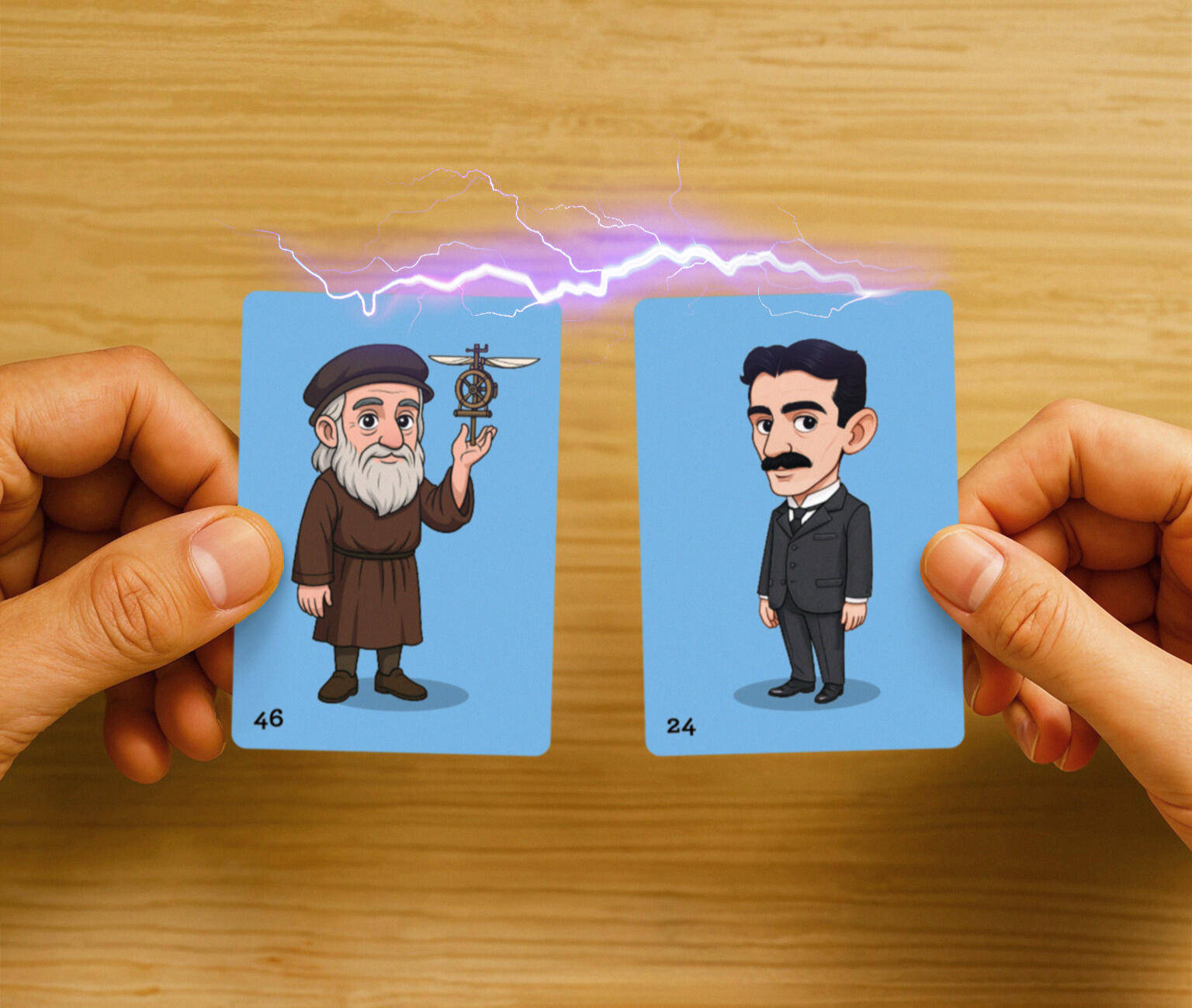
1. Players take turns creating funny or meaningful connections between two cards they draw (e.g., what would da Vinci and Tesla invent together?)
2. When everyone finishes their ideas they share it clock wise. The group votes on the most creative answer. That player wins the round.
3. Whoever is the first to win 5 rounds, wins the game.
2. Guess by the description

1. A dedicated player secretly picks any card from the deck and checks the number in the bottom-left corner.
2. The player then clicks on that number on the quoteworthy homepage
or offline version to read the historical figure’s description.
Read it aloud—without saying the name—and give clues if needed.
3. The first player to guess correctly wins the card.
4.Turn continues to the next player who does the same, secretly picks the card and read the description online while others guess which historical figure is being described.
5. Whoever is the first to collect 10 cards, wins the game.
3. Know the Face?
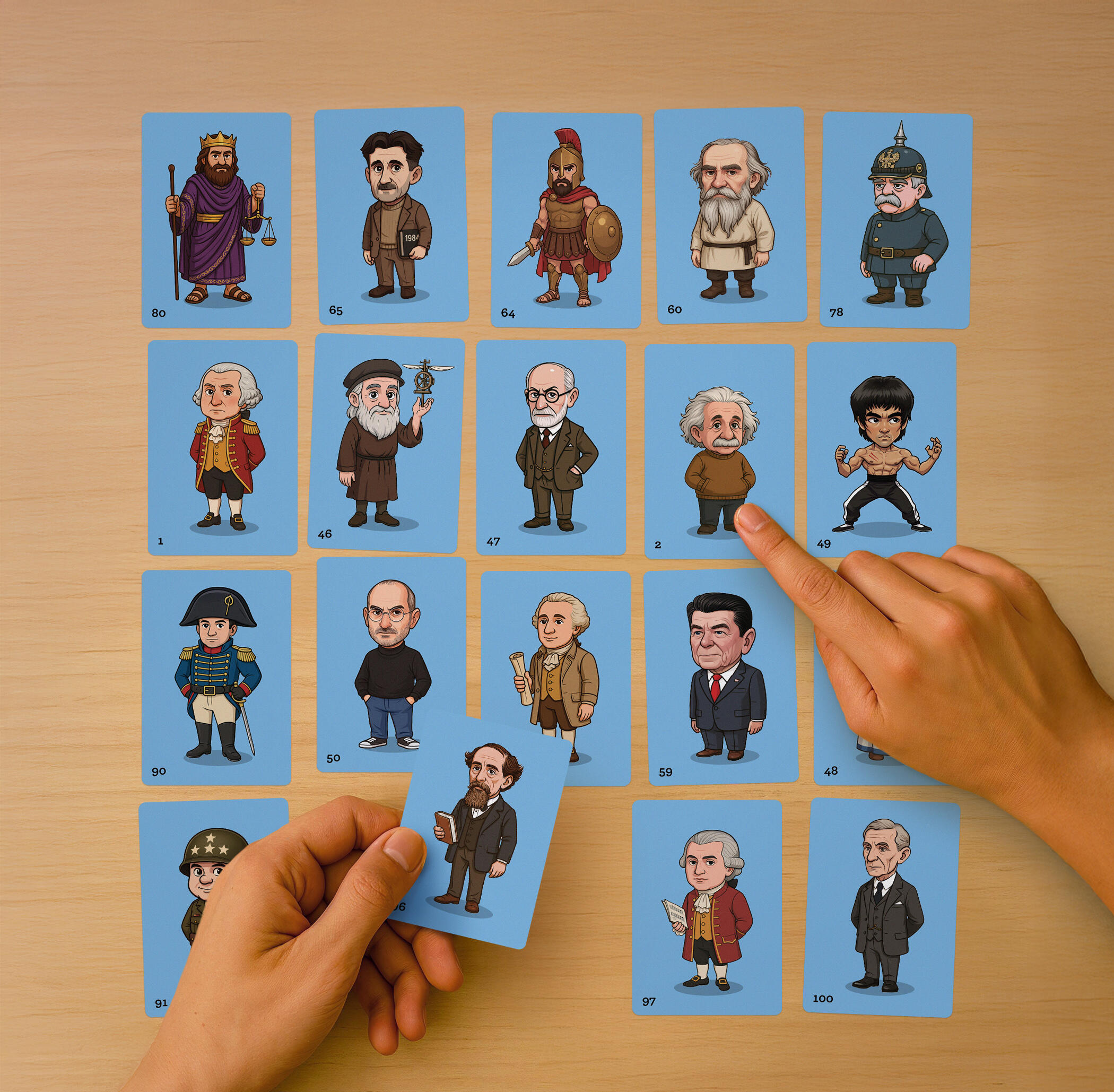
1. Lay out 12–20 cards portrait side up on the table.
2. Players take turns pointing to any portrait and trying to recite or closely paraphrase the quote on the back.
3. If the player on their turn correctly recites or closely paraphrase the quote, they get to keep the card.
4. No player can take more than 5 cards per turn - to prevent a single player from taking all the cards in one turn.
5. Whoever has the most cards when there are no cards left on the table, wins the game.
1. Figure reveal _ print ready booklet PDF
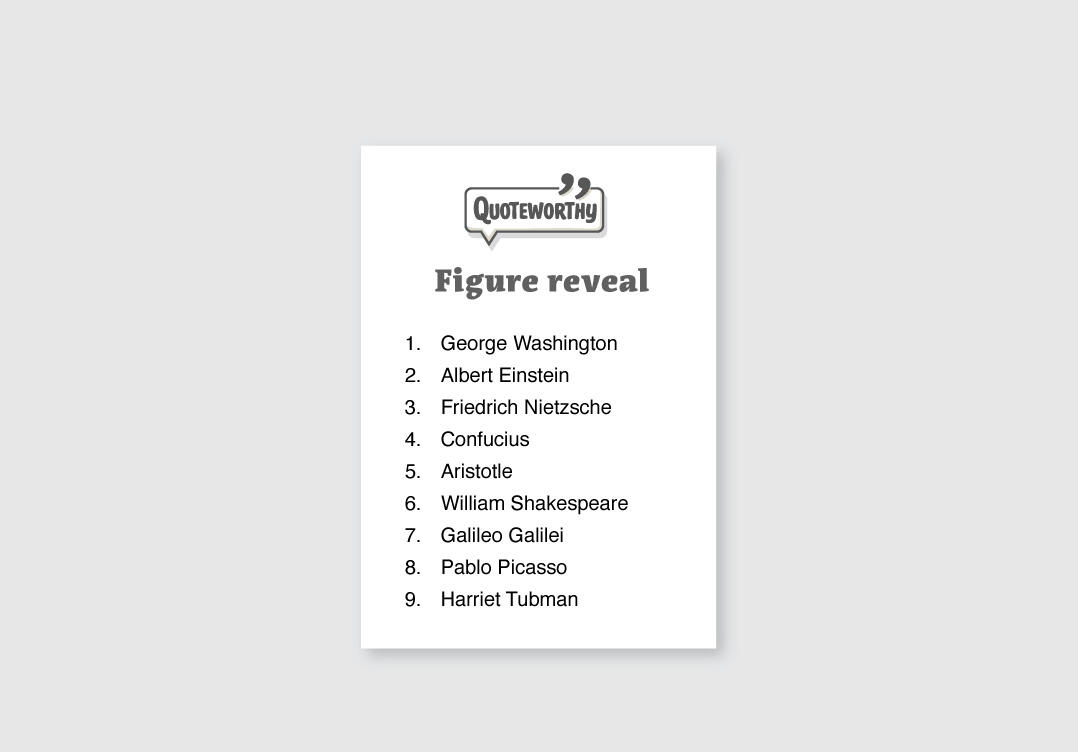
Official Quoteworthy Answer Booklet (11" × 8.5") — a printable companion to reveal the historical figure behind each card number.
2. Reflect and respond _ print ready PDF
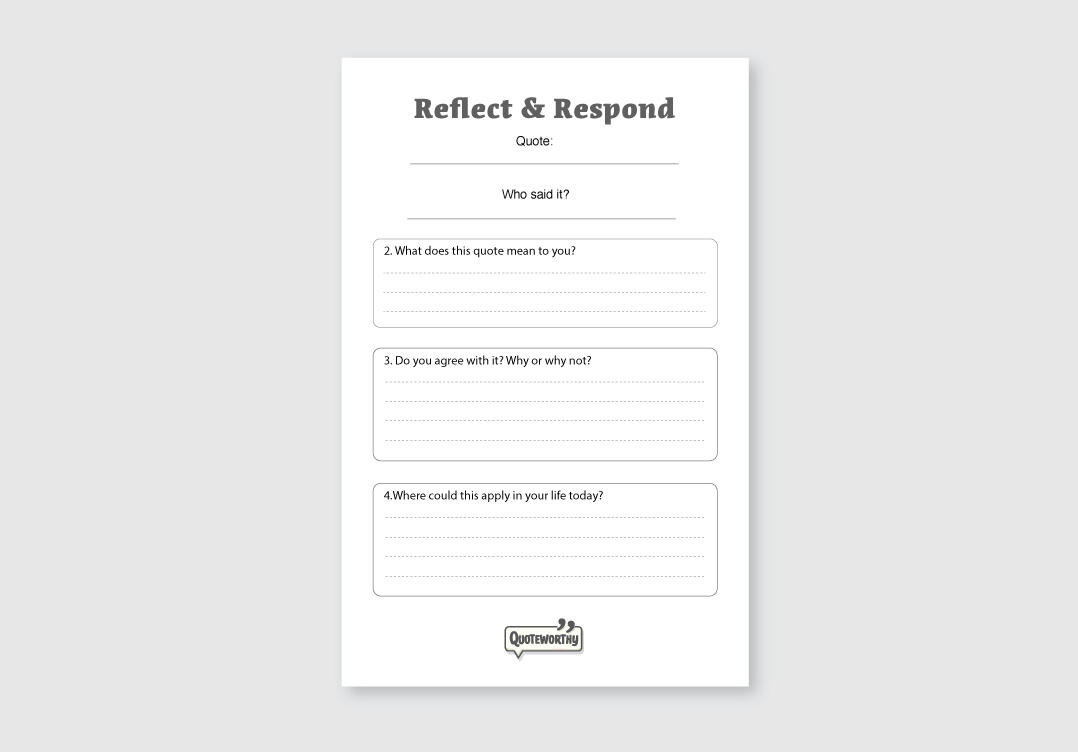
Encourage deeper thinking and meaningful discussions with this printable activity sheet. Designed for students or group settings. Each 8.5" × 11" page includes two worksheets for easy printing and cutting.
3. Write your quote _ print ready PDF
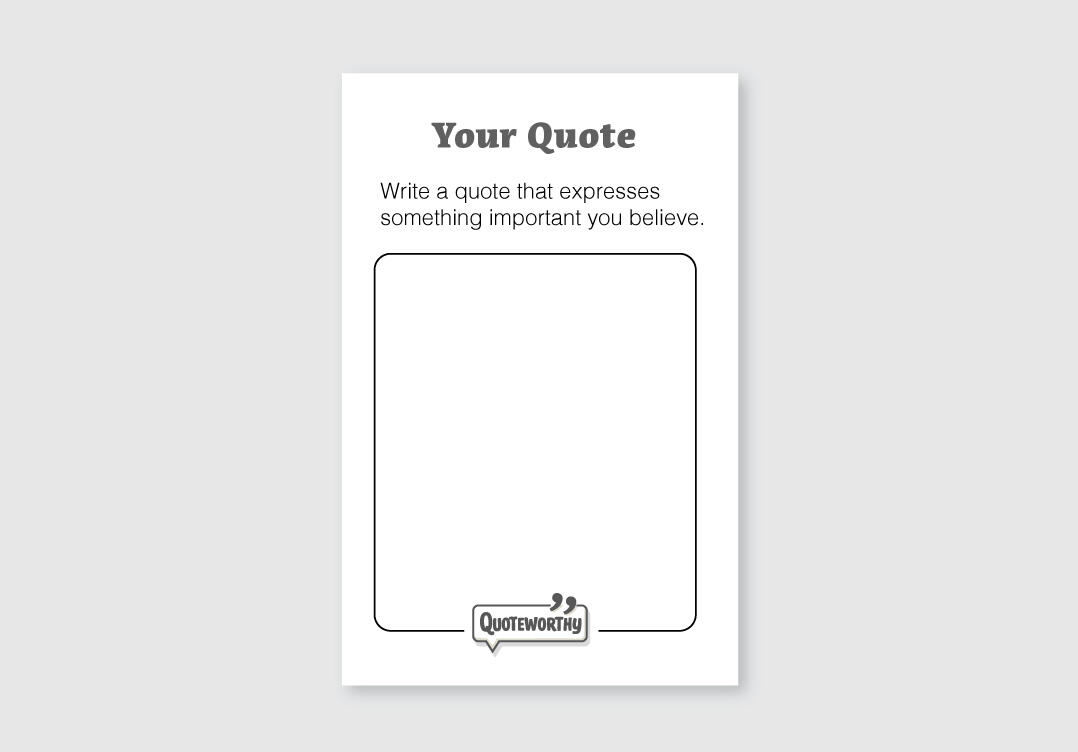
Inspire creativity and self-expression with this engaging activity sheet. Each card invites students or participants to write a personal quote. Each 8.5" × 11" sheet is print-ready and includes 8 cards per page for easy distribution.
QUOTEWORTHY – Complete Offline Edition
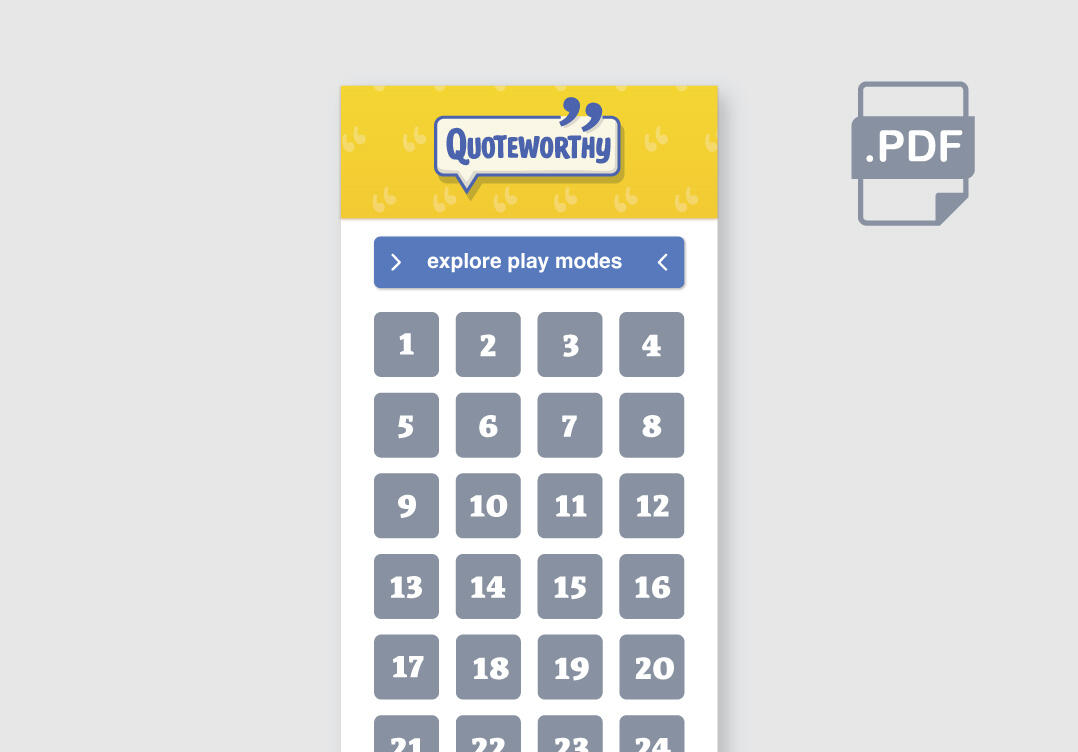
Enjoy the full game anywhere—no internet needed. This clickable PDF includes every clue, answer, description, and story behind the quote, all in one easy-to-use format.



































































































